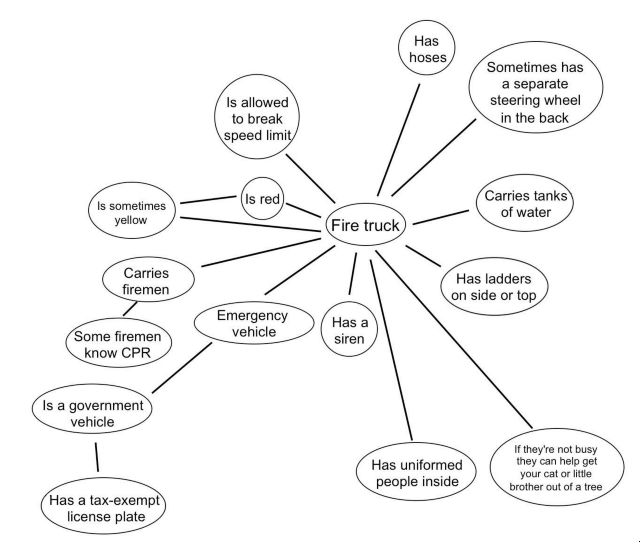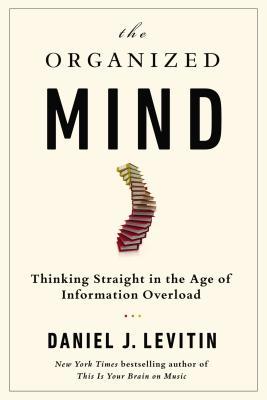Thinking Straight in the Age of Information Overload
The Organized Mind: Thinking Straight in the Age of Information Overload, a book by Daniel Levitin, explores “how humans have coped with information and organization from the beginning of civilization. … It’s also the story of how the most successful members of society—from successful artists, athletes, and warriors, to business executives and highly credentialed professionals—have learned to maximize their creativity, and efficiency, by organizing their lives so that they spend less time on the mundane, and more time on the inspiring, comforting, and rewarding things in life.”
Memory
Memory is fallible. More than just remembering things wrongly, “we don’t even know we’re remembering them wrongly.”
The first humans who figured out how to write things down around 5,000 years ago were in essence trying to increase the capacity of their hippocampus, part of the brain’s memory system. They effectively extended the natural limits of human memory by preserving some of their memories on clay tablets and cave walls, and later, papyrus and parchment. Later, we developed other mechanisms —such as calendars, filing cabinets, computers, and smartphones— to help us organize and store the information we’ve written down. When our computer or smartphone starts to run slowly, we might buy a larger memory card. That memory is both a metaphor and a physical reality. We are off-loading a great deal of the processing that our neurons would normally do to an external device that then becomes an extension of our own brains, a neural enhancer.These external memory mechanisms are generally of two types, either following the brain’s own organizational system or reinventing it, sometimes overcoming its limitations. Knowing which is which can enhance the way we use these systems, and so improve our ability to cope with information overload.
And once memory became external (written down and stored) our attention systems “were freed up to focus on something else.”
But we need a place (and a system) to organize all of this information.
The indexing problem is that there are several possibilities about where you store this report, based on your needs: It could be stored with other writings about plants, or with writings about family history, or with writings about cooking, or with writings about how to poison an enemy.
This brings us to two aspects of the human brain that are not given their due: richness and associative access.
Richness refers to the theory that a large number of the things you’ve ever thought or experienced are still in there, somewhere. Associative access means that your thoughts can be accessed in a number of different ways by semantic or perceptual associations— memories can be triggered by related words , by category names, by a smell, an old song or photograph, or even seemingly random neural firings that bring them up to consciousness.Being able to access any memory regardless of where it is stored is what computer scientists call random access. DVDs and hard drives work this way; videotapes do not. You can jump to any spot in a movie on a DVD or hard drive by “pointing” at it. But to get to a particular point in a videotape, you need to go through every previous point first (sequential access). Our ability to randomly access our memory from multiple cues is especially powerful. Computer scientists call it relational memory. You may have heard of relational databases— that’s effectively what human memory is.[…]Having relational memory means that if I want to get you to think of a fire truck, I can induce the memory in many different ways. I might make the sound of a siren, or give you a verbal description (“ a large red truck with ladders on the side that typically responds to a certain kind of emergency”).
We categorize objects in a seemingly infinite number of ways. Each of those ways “has its own route to the neural node that represents fire truck in your brain.” Take a look at one way we can think of a firetruck.

Thinking about one memory or association activates more. This can be both a strength and a weakness.
If you are trying to retrieve a particular memory, the flood of activations can cause competition among different nodes, leaving you with a traffic jam of neural nodes trying to get through to consciousness, and you end up with nothing.
Organizing our Lives
The ancients Greeks came up with memory palaces and the method of loci to improve memory. The Egyptians became experts at externalizing information, inventing perhaps the biggest pre-google repository of knowledge, the library.
We don’t know why these simultaneous explosions of intellectual activity occurred when they did (perhaps daily human experience had hit a certain level of complexity). But the human need to organize our lives, our environment, even our thoughts, remains strong. This need isn’t simply learned, it is a biological imperative— animals organize their environments instinctively.
But the odd thing about the mind is that it doesn’t, on its own, organize things the way you might want it to. It’s largely an unconscious process.
It comes preconfigured, and although it has enormous flexibility, it is built on a system that evolved over hundreds of thousands of years to deal with different kinds and different amounts of information than we have today. To be more specific: The brain isn’t organized the way you might set up your home office or bathroom medicine cabinet. You can’t just put things anywhere you want to. The evolved architecture of the brain is haphazard and disjointed, and incorporates multiple systems, each of which has a mind of its own (so to speak). Evolution doesn’t design things and it doesn’t build systems— it settles on systems that, historically, conveyed a survival benefit (and if a better way comes along, it will adopt that). There is no overarching, grand planner engineering the systems so that they work harmoniously together. The brain is more like a big, old house with piecemeal renovations done on every floor, and less like new construction.Consider this, then, as an analogy: You have an old house and everything is a bit outdated, but you’re satisfied. You add a room air conditioner during one particularly hot summer. A few years later, when you have more money, you decide to add a central air-conditioning system. But you don’t remove that room unit in the bedroom— why would you ? It might come in handy and it’s already there, bolted to the wall. Then a few years later, you have a catastrophic plumbing problem—pipes burst in the walls. The plumbers need to break open the walls and run new pipes, but your central air-conditioning system is now in the way, where some of their pipes would ideally go. So they run the pipes through the attic, the long way around. This works fine until one particularly cold winter when your uninsulated attic causes your pipes to freeze. These pipes wouldn’t have frozen if you had run them through the walls, which you couldn’t do because of the central air-conditioning. If you had planned all this from the start, you would have done things differently, but you didn’t— you added things one thing at a time, as and when you needed them.
Or you can use Sherlock Holmes’ analogy of a memory attic. As Holmes tells Watson, “I consider that a man’s brain originally is like a little empty attic, and you have to stock it with such furniture as your choose.”
Levitin argues that we should learn “how our brain organizes information so that we can use what we have, rather than fight against it.” We do this primarily through the key processes of encoding and retrieval.
(Our brains are) built as a hodgepodge of different systems, each one solving a particular adaptive problem. Occasionally they work together, occasionally they’re in conflict, and occasionally they aren’t even talking to one another. Two of the key ways that we can control and improve the process are to pay special attention to the way we enter information into our memory— encoding—and the way we pull it out— retrieval.
We’re busier than ever. That’s not to say that it’s information overload, as there are arguments to why that doesn’t exist. Our internal to-do list is never satisfied. We’re overwhelmed with things disguised as wisdom or even information and we’re forced to sort through the nonsense. Levitin implies that one consequence to this approach is that we’re losing things. Our keys. Our driver’s licenses. Our iPhone. And it’s not just physical things. “we also forget things we were supposed to remember, important things like the password to our e-mail or a website, the PIN for our cash cards— the cognitive equivalent of losing our keys.”
These are important and hard to replace things.
We don’t tend to have general memory failures; we have specific, temporary memory failures for one or two things. During those frantic few minutes when you’re searching for your lost keys, you (probably) still remember your name and address, where your television set is, and what you had for breakfast —it’s just this one memory that has been aggravatingly lost. There is evidence that some things are typically lost far more often than others: We tend to lose our car keys but not our car, we lose our wallet or cell phone more often than the stapler on our desk or soup spoons in the kitchen, we lose track of coats and sweaters and shoes more often than pants. Understanding how the brain’s attentional and memory systems interact can go a long way toward minimizing memory lapses.These simple facts about the kinds of things we tend to lose and those that we don’t can tell us a lot about how our brains work, and a lot about why things go wrong.
The way this works is fascinating. Levitin also hits on a topic that has long interested me. “Companies,” he writes, “are like expanded brains, with individual workers functioning something like neurons.”
Companies tend to be collections of individuals united to a common set of goals, with each worker performing a specialized function. Businesses typically do better than individuals at day-to-day tasks because of distributed processing. In a large business, there is a department for paying bills on time (accounts payable), and another for keeping track of keys (physical plant or security). Although the individual workers are fallible, systems and redundancies are usually in place, or should be, to ensure that no one person’s momentary distraction or lack of organization brings everything to a grinding halt. Of course, business organizations are not always prefectly organized, and occasionally, through the same cognitive blocks that cause us to lose our car keys, businesses lose things, too— profits, clients, competitive positions in the marketplace.
In today’s world it’s hard to keep up. We have pin numbers, phone numbers, email addresses, multiple to-do lists, small physical objects to keep track of, kids to pick up, books to read, videos to watch, nearly infinite websites to browse, and so on. Most of us, however, are still largely using the systems to organize and maintain this knowledge that were put into place in a less informatic time.
The Organized Mind: Thinking Straight in the Age of Information Overload shows us how to organize our time better, “not just so we can be more efficient but so we can find more time for fun, for play, for meaningful relationships, and for creativity.”

No comments:
Post a Comment